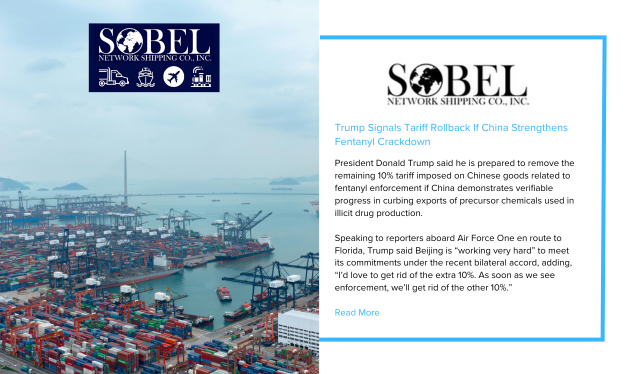President Donald Trump said he is prepared to remove the remaining 10% tariff imposed on Chinese goods related to fentanyl enforcement if China demonstrates verifiable progress in curbing exports of precursor chemicals used in illicit drug production.
Speaking to reporters aboard Air Force One en route to Florida, Trump said Beijing is “working very hard” to meet its commitments under the recent bilateral accord, adding, “I’d love to get rid of the extra 10%. As soon as we see enforcement, we’ll get rid of the other 10%.”
The statement follows the release of a White House fact sheet outlining the trade measures agreed upon by the United States and China during a meeting between Trump and Chinese President Xi Jinping in South Korea on October 30, 2025.
China’s Commitments Under the Agreement
According to the White House summary, China agreed to a broad series of actions to improve trade relations and address U.S. concerns over both economic and security issues, including:
-
Suspending global implementation of new rare earth export controls announced earlier in October.
-
Issuing general export licenses for rare earths, gallium, germanium, antimony, and graphite, effectively lifting restrictions dating back to 2022.
-
Implementing strict measures to stop fentanyl chemical exports to North America and other destinations.
-
Suspending retaliatory tariffs on U.S. agricultural products such as soybeans, wheat, corn, pork, beef, and dairy, along with lifting related non-tariff measures.
-
Resuming major U.S. agricultural imports, including at least 12 million metric tons (MMT) of soybeans in the final months of 2025, and 25 MMT annually from 2026 through 2028.
-
Restoring operations at Nexperia’s China-based chip facilities, ensuring continued production of critical legacy semiconductors for global markets.
-
Rolling back retaliatory measures tied to the U.S. Section 301 investigation into China’s maritime and logistics sectors.
-
Extending tariff exclusion processes for U.S. imports until December 31, 2026.
-
Ending investigations targeting U.S. semiconductor firms, including antitrust and anti-dumping probes.
U.S. Actions Under the Agreement
In exchange, the United States will:
-
Reduce tariffs by 10 percentage points on Chinese imports tied to fentanyl enforcement beginning November 10, 2025.
-
Suspend additional reciprocal tariffs on Chinese imports until November 10, 2026, maintaining the existing 10% rate during that period.
-
Extend Section 301 tariff exclusions from November 29, 2025, to November 10, 2026.
-
Pause for one year the implementation of new end-user controls and actions arising from the Section 301 investigation into China’s maritime and shipbuilding sectors.
The agreement reflects a cautious easing of trade tensions following years of escalating tariff measures between the two countries. It also reopens channels for agricultural, industrial, and technology trade that had been strained since 2018.
Trade compliance professionals are closely watching for Customs and Border Protection (CBP) and other U.S. agency guidance on how the tariff adjustments and enforcement provisions will be implemented.
The National Customs Brokers & Forwarders Association of America (NCBFAA) and counsel at Sandler, Travis & Rosenberg, P.A. said they will continue to monitor regulatory updates and provide guidance to importers, exporters, and brokers as implementation details emerge.


